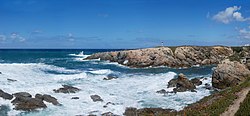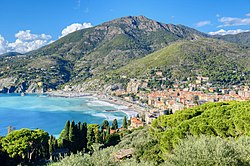Coast
The coast is wherever land meets the sea.
The coast also means the land next to the sea, which can also be called the shore, or sea-shore. However, coast is not used to describe where rivers or lakes meet the land - it is only used to describe the sea meeting the land.
If a house is near to the coast we say it is "on the coast". When we talk about a long part of the coast we call it "the coast-line". Sometimes, 'coast' can be part of a place name or the description of a large area. For instance, the East Coast of the United States describes the all of the Eastern side of the United States that is next to the Atlantic Ocean.
In some countries like England or Australia the people sometimes use the word sea-side for the coast.
Coasts often have many living things living there and provide habitat for many animals and plants.
An example of a coast in Great Britain is the Holderness Coast near Bridlington. This is one of Europe's fast eroding coasts.
Coast Media
Rugged coastline of the West Coast Region of New Zealand
Southeast coast of Greenland
Escorca coast, Serra de Tramuntana (Balearic Islands)
Somalia has the longest coastline in Africa.
Atlantic rocky coastline, showing a surf area. Porto Covo, west coast of Portugal
Seaside in Budelli, Italy. Budelli beach is famous for the color of its sand, which is pink due to the presence of fragments of a microorganism called Miniacina miniacea.
The Cinque Terre, along the Italian Riviera










